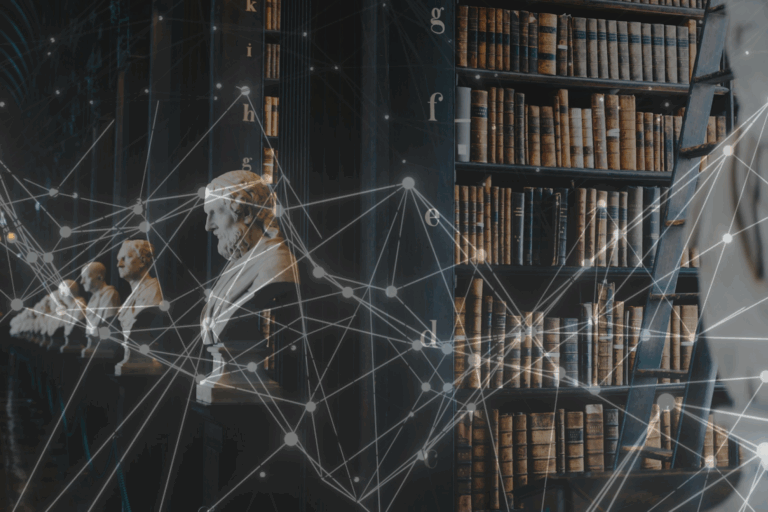The pixelated future of work: Leading in the age of AI-driven atomisation
Work is evolving fast. Pixelisation and AI are reshaping how tasks are assigned, tracked, and rewarded—demanding smarter systems, adaptable people, and dynamic leadership.
Work is evolving fast. Pixelisation and AI are reshaping how tasks are assigned, tracked, and rewarded—demanding smarter systems, adaptable people, and dynamic leadership.

AIOps can reduce IT chaos and boost ROI. Real-world examples and expert insight from Riverbed’s Charbel Khneisser on the NODE Podcast.

Discover how enterprises can maximise AIOps ROI by reducing complexity, consolidating tools, and embracing scalable strategies.

Technology is evolving rapidly, offering both challenges and solutions. Business leaders now view innovation as essential for progress, unity, and tackling global issues responsibly.

Hybrid organisations blend human talent, digital tools, and AI to drive agility, innovation, and resilience—redefining leadership, communication, and performance in the future of work.

AI is reshaping UK legal disclosure, offering efficiency gains in criminal and civil cases—yet requires careful oversight, transparency, and adherence to legal safeguards.

GenAI projects often fail due to poor data, unclear value, or unrealistic expectations. Success demands strategic alignment, robust data readiness, and cross-functional collaboration.

AI is revolutionising supply chains by enhancing efficiency, resilience, and collaboration—empowering humans to focus on strategy while machines handle complexity, risk, and repetitive tasks.

To maximise AI project success, define clear goals, secure data access, embrace iterative learning, and don’t fear pausing or pivoting when needed—progress comes from persistence.

Alex von Schirmeister, Managing Director of Xero UK, highlights the growing digital divide for small businesses and urges action to support their digital transformation and future prosperity.

John Sullivan, VP at IBM Global Business Services UKI, discusses how businesses can move beyond GenAI proof of concepts, overcoming challenges like data quality, operating models, and reuse to scale enterprise-wide adoption.

Vadim Vladimirskiy, CEO of Nerdio, shares lessons on scaling a business sustainably, focusing on adaptability, customer-centric innovation, and cultivating a strong company culture.

Alcatel-Lucent Enterprise’s Moussa Zaghdoud on the challenges and opportunities of a shift to hybrid cloud, and the future of tech teams

What are the forces shaping software and data-driven industries in 2025? Hint: It’s AI, says our panel of experts.

A panel of industry experts explores how AI, omnichannel strategies, and data-driven insights will shape retail and financial services in 2025, enhancing efficiency, security, and customer experience.

IFS Ultimo’s Berend Booms on how manufacturers must invest in intelligent, automated asset management to survive and thrive.

What technology investments will keep construction and manufacturing leaders occupied in 2025? Our panel opines.

A panel of experts discuss the technology trends set to occupy CIOs in primary industries, including mining and energy generation.

In 2025, CIOs must drive AI adoption and deliver ROI. Julian Mulhare, Managing Director EMEA at Searce, discusses the factors that matter.

Karel Callens, CEO of Luzmo, discusses how the Flex SDK bridges the gap between low-code simplicity and developer flexibility, shaping the future of app development.

Great data stories turn insights into action. By focusing on business priorities, speaking in financial terms, and advocating for users, analysts can drive impactful, data-driven decisions.

AI, ML, and generative technologies are transforming supply chains by enhancing efficiency, reducing costs, and enabling autonomous decision-making for logistics companies.

UK and European companies are leveraging AI-powered identity verification and fraud detection solutions to combat cyberthreats like deepfakes, ensuring data security and building digital trust.

As computing evolves, organisations must prepare for three phases: edge computing, hybrid systems, and autonomous technologies, each reshaping business operations and human-technology interaction.

The creative agency that is combining cutting-edge technology with best-in-class talent.

How Salling Group successfully built a grocery home delivery service at turbo-speed during COVID-19.

The transport and mobility sector is changing before our eyes, and those who don’t adapt will be left behind

Research carried out by Censuswide identifies the biggest concerns for UK IT leaders.

Retailers must blend strong logistics, AI-powered personalisation, real-time visibility and robust data foundations to meet rising customer expectations and drive successful Black Friday performance in 2025.

AI has the potential to revolutionise cybersecurity for Critical National Infrastructure (CNI), enabling smarter threat detection, operational resilience, and faster incident response in an evolving threat landscape.

AI and automation have finally come of age, and they’re changing everything. We sit down with prominent leaders from Bain & Company, Workato and Skan AI to investigate the past and discuss the future.

HARTMANN GROUP has been at the forefront of healthcare innovation for nearly 200 years. Today, technology transformation and new digital business models are enabling it to “go further for health”. Digital Bulletin met with CIO Sinanudin Omerhodzic and his team to find out more
Work is evolving fast. Pixelisation and AI are reshaping how tasks are assigned, tracked, and rewarded—demanding smarter systems, adaptable people, and dynamic leadership.

AIOps can reduce IT chaos and boost ROI. Real-world examples and expert insight from Riverbed’s Charbel Khneisser on the NODE Podcast.

Discover how enterprises can maximise AIOps ROI by reducing complexity, consolidating tools, and embracing scalable strategies.

Technology is evolving rapidly, offering both challenges and solutions. Business leaders now view innovation as essential for progress, unity, and tackling global issues responsibly.

Hybrid organisations blend human talent, digital tools, and AI to drive agility, innovation, and resilience—redefining leadership, communication, and performance in the future of work.

AI is reshaping UK legal disclosure, offering efficiency gains in criminal and civil cases—yet requires careful oversight, transparency, and adherence to legal safeguards.

GenAI projects often fail due to poor data, unclear value, or unrealistic expectations. Success demands strategic alignment, robust data readiness, and cross-functional collaboration.

AI is revolutionising supply chains by enhancing efficiency, resilience, and collaboration—empowering humans to focus on strategy while machines handle complexity, risk, and repetitive tasks.

To maximise AI project success, define clear goals, secure data access, embrace iterative learning, and don’t fear pausing or pivoting when needed—progress comes from persistence.

Alex von Schirmeister, Managing Director of Xero UK, highlights the growing digital divide for small businesses and urges action to support their digital transformation and future prosperity.

John Sullivan, VP at IBM Global Business Services UKI, discusses how businesses can move beyond GenAI proof of concepts, overcoming challenges like data quality, operating models, and reuse to scale enterprise-wide adoption.

Vadim Vladimirskiy, CEO of Nerdio, shares lessons on scaling a business sustainably, focusing on adaptability, customer-centric innovation, and cultivating a strong company culture.

Alcatel-Lucent Enterprise’s Moussa Zaghdoud on the challenges and opportunities of a shift to hybrid cloud, and the future of tech teams

What are the forces shaping software and data-driven industries in 2025? Hint: It’s AI, says our panel of experts.

A panel of industry experts explores how AI, omnichannel strategies, and data-driven insights will shape retail and financial services in 2025, enhancing efficiency, security, and customer experience.

IFS Ultimo’s Berend Booms on how manufacturers must invest in intelligent, automated asset management to survive and thrive.

What technology investments will keep construction and manufacturing leaders occupied in 2025? Our panel opines.

A panel of experts discuss the technology trends set to occupy CIOs in primary industries, including mining and energy generation.

In 2025, CIOs must drive AI adoption and deliver ROI. Julian Mulhare, Managing Director EMEA at Searce, discusses the factors that matter.

Karel Callens, CEO of Luzmo, discusses how the Flex SDK bridges the gap between low-code simplicity and developer flexibility, shaping the future of app development.

Great data stories turn insights into action. By focusing on business priorities, speaking in financial terms, and advocating for users, analysts can drive impactful, data-driven decisions.

AI, ML, and generative technologies are transforming supply chains by enhancing efficiency, reducing costs, and enabling autonomous decision-making for logistics companies.

UK and European companies are leveraging AI-powered identity verification and fraud detection solutions to combat cyberthreats like deepfakes, ensuring data security and building digital trust.

As computing evolves, organisations must prepare for three phases: edge computing, hybrid systems, and autonomous technologies, each reshaping business operations and human-technology interaction.